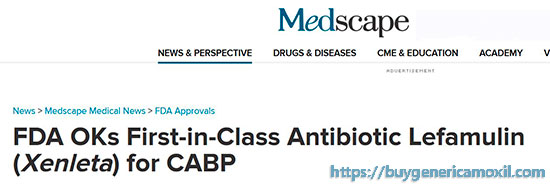The US Food and Drug Administration (FDA) has registered a new indication for the use of Recarbrio (a combination of imipenem, cilastatin and relebactam) for the treatment of hospital pneumonia (GP) and ventilator-associated or ventilator-associated bacterial pneumonia (VAP) in patients aged 18 years and older. Previously, Recarbrio was registered for the treatment of severe infections of the genitourinary system and complicated intraabdominal infections in patients with no or limited opportunities to use alternative therapy. Is the new antibiotic safe and have studies been conducted?
According to the FDA, the new fertilizer contributes to the development of safe and effective therapy against the threat of the spread of infections resistant to antibiotics.
GP and VAP are types of bacterial pneumonia that occurs in patients in a hospital setting, and can cause symptoms such as fever, chills, chest pain, increased oxygen demand. Also, these types of pneumonia are characterized by high mortality. Recarbrio is a combination of imipenem, cilastatin and relebactam and is administered intravenously in a hospital.

The safety and efficacy of the drug were evaluated during a randomized controlled clinical trial involving 535 hospitalized adult volunteers diagnosed with GP / VAP pneumonia with the pathogen – gram-negative bacteria, of which 266 patients received Recarbrio therapy and 269 patients received another antimicrobial drug piperacillin-tazobactam. As of the 28th day of the study, the mortality rate in the Recarbrio group was 16%, in the second group – 21%.
The most common adverse reactions to taking the drug included an increased level of liver enzymes, anemia, diarrhea, hypokalemia, hyponatremia. Before prescribing Recarbrio, special attention should be paid to detecting hypersensitivity reactions to carbapenems, penicillins, cephalosporins, other beta-lactams and other allergens in the patient’s history. The drug should not be prescribed to patients who are prone to convulsive seizures and other manifestations of diseases of the central nervous system.
A new antibiotic for the treatment of life-threatening infections has been approved in the US
The US Food and Drug Administration (FDA) has registered delafloxacin (delafloxacin) manufactured by Melinta Therapeutics for the treatment of severe or life-threatening infectious diseases caused, among other things, by drug-resistant bacteria. This is reported by Medscape.
Delafloxacin belongs to the class of fluoroquinolones and is intended primarily for use among adult patients with acute bacterial infections of the skin and skin structures (ABSSSIs) associated with gram-positive and gram-negative pathogens, including methicillin-resistant staphylococcus aureus.
The new antibiotic was recognized by the FDA as safe and effective according to the results of randomized clinical trials conducted with the participation of 1,500 adult patients with ABSSSIs. Delafloxacin was compared with combination therapy with vancomycin and aztreonam. In one CI, delafloxacin is administered intravenously during the entire duration of therapy, and in the other, at the beginning of therapy, intravenously, and then patients were transferred to oral antibacterial therapy. In both trials, the effectiveness of delafloxacin was comparable to standard combination therapy – skin lesions were reduced by at least 20% within 48-72 hours.